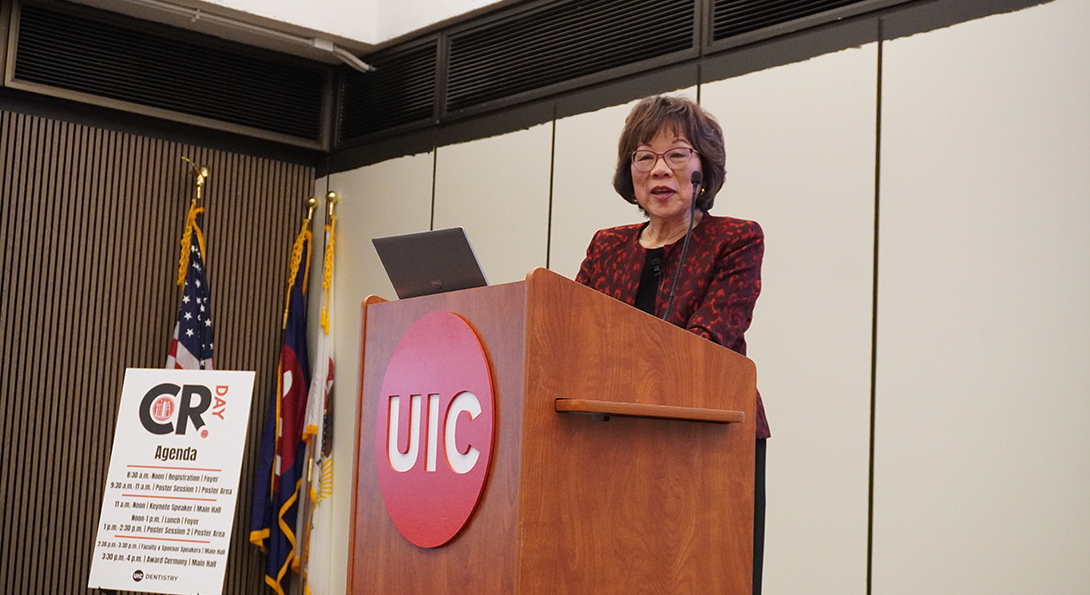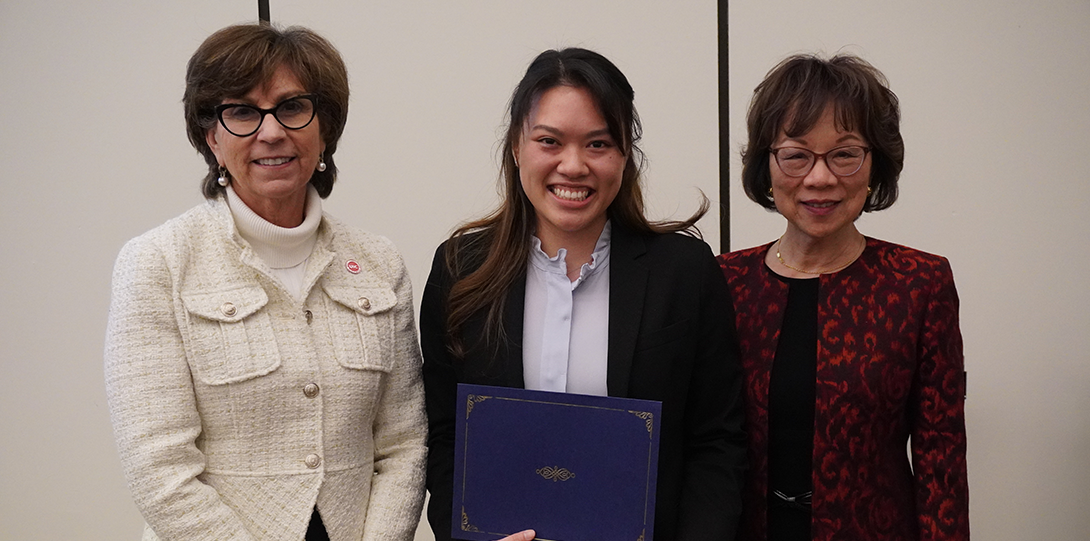Longtime professor launches scholarship for student research

First section
For Dr. Christine Wu, research has powered an energizing life.
A leading figure in the field of nutrition and oral health, Wu’s extensive and distinguished research career touches five different decades. Research has allowed Wu to explore novel scientific questions and build a vast network of collaborators across academia and industry. It’s led to faculty positions at four different universities and spurred travel to conferences in the U.S. and abroad. It’s provided uplifting relationships and consistent intellectual stimulation.
“Research has been my life, and it’s benefited me,” confirms Wu, professor in the department of pediatric dentistry at the UIC College of Dentistry.
But Wu knows research isn’t on the mind of many dental school students, especially as they contemplate their futures. Most will enter the clinical ranks. Some will pursue additional education in a specialty area like orthodontics or oral surgery. A few might find their way into academic dentistry, public health environments or government service. Only a fraction will entertain a research career.
It is something Wu hopes to change with a new scholarship at the College of Dentistry designed to involve students in research, elevate their dental school experience and ignite new professional opportunities.
The Dr. Christine Da-Ruh Wu Dental Student Research Scholarship Fund will award scholarships to UIC College of Dentistry students who demonstrate excellence in research. In addition to funding research projects, students may also use the scholarship dollars to attend professional conferences.
“I want to promote good research and nurture those students interested in research so they can see the exciting possibilities,” Wu says.
An unexpected pivot
As a young research scientist, Wu could not have imagined the turns her career would take.
After earning her undergraduate degree in botany from National Taiwan University in her native Taiwan, Wu ventured to Chicago to pursue graduate studies in microbiology at Loyola University Chicago’s Stritch School of Medicine. Her PhD work at Loyola focused on – of all things – foot fungi like athlete’s foot.
When she began a post-doctoral fellowship in microbiology and immunology at Northwestern University’s Feinberg School of Medicine in 1977, her research shifted dramatically. Working for Dr. Hutton Slade, a renowned researcher who specialized in dental caries bacteria, Wu moved from investigating fungus on the feet to bacteria in the mouth.
“It was scary because I had so much to learn,” Wu says. “Bacteria are not only a totally different class of organisms, but I had to learn about teeth, mouth and anatomy as well.”
Wu’s time at Northwestern laid the foundation for a decorated research career that would take her to faculty positions at Chicago State University, the University of Colorado and the University of Iowa before she joined the UIC College of Dentistry faculty roster in 1997.
Innovative research
Wu’s research focuses on the prevention and control of dental plaque bacteria using nutrition and health strategies. While foods deliver well-documented nutritional value, she believes they possess another powerful benefit: components supporting oral health by inhibiting dental plaque bacteria and reducing caries risk.
Four decades ago, Wu first began exploring natural substances and compounds capable of affecting oral pathogens, one of the earliest investigators in a now-surging field. Early on, she teamed with natural product companies to develop and test items such as toothpaste and gum and collaborated with pharmacists and natural products chemists to identify and purify oral pathogens-battling compounds.
Over the years, her research gradually transitioned into food and beverages. She has studied how ubiquitous beverages such as tea and milk as well as common foods like cranberries, dried plums, honey and raisins impact cavity-causing bacteria in the mouth.
“We’re trying to show there are foods with anti-caries potential and foods that can counteract the damaging effect of sugars and benefit oral health,” Wu says. “It’s an innovative way to think about reducing cavities and definitely a paradigm shift.”
In one recently completed project, for instance, Wu found chasing candy with milk or two cubes of Swiss cheese minimized the harmful impacts of sugar on the teeth. The dairy, she notes, counteracted the acid produced by the sugar.
“It’s another sign diet and foods can be beneficial to our oral health,” Wu says.
Leung

Supporting next-gen researchers
Wu has a long history of championing student research at UIC.
As the College of Dentistry’s first associate dean for research, a role she held 2002-2007, Wu established the office of research and launched a student research group and a summer student research program among other initiatives. She was also active in mentoring students enrolled in the college’s research-oriented oral sciences graduate program.
“Whenever possible, I wanted to showcase opportunities for research and encourage students to pursue interesting questions,” says Wu, who earned the college’s Outstanding Research Mentor of the Year award in 2009.
With the Dr. Christine Da-Ruh Wu Dental Student Research Scholarship Fund, Wu hopes to inspire a new generation of UIC dental students to examine fascinating questions that challenge convention and advance oral health.
“I want to unlock opportunity for these students to do research and discover,” Wu says. “Maybe they present their research at conferences. Maybe they even get into academia and continue pursuing research.”
At the College of Dentistry’s annual Clinic and Research Day on February 27, Kasey Leung, a fifth-year student in UIC’s DMD/PhD program, was named the inaugural recipient of the Wu Scholarship. Leung, whose ongoing research focuses on anti-inflammatory extracellular vesicles and their controlled delivery, hopes to use the award to travel to professional conferences, where she can both expand her knowledge base and build relationships with other researchers.
“This award encourages me to continue my research and supports my interest in becoming a clinician-scientist,” Leung says. “It’s keeping me connected to my research and on an exciting track.”